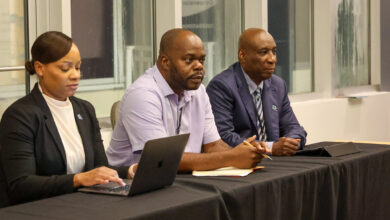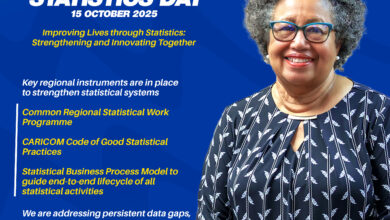Conscious of their manifest potency, the Antiguan and Barbudan people are quite likely to set about devising means of seeking my immediate impeachment should I fail to begin my remarks with the affirmation which is now virtually mandatory in Antigua and Barbuda; on all occasions, and at every level.
It is thus my duty, on behalf of the Antiguan and Barbudan people, to open this meeting with the sentiment that seemingly all in our country share and are anxious to proclaim to the world.
Welcome to Government in the Sunshine!
For us, ladies and gentlemen, this declaration goes beyond Government in the Sunshine of Public Scrutiny and speaks to rebirth, renewal and fresh energy.
Permit me another reference to the sunshine.
We are here to grapple with very troubling issues which have exercised the minds of CARICOM Heads of Government over recent months. Chief among these issues is, of course, Haiti. Our sister CARICOM country remains in the throes of a deep political, economic and social crisis. It will take every ounce of CARICOM goodwill, compassion, commitment, common sense and courage to make a breakthrough.
Two hundred years ago, our precursors in Haiti struck a blow for freedom, which was heard around the world, and across centuries. The armies of Napoleon were defeated. The British were routed. The Spanish were put to flight. The world’s first black republic, and the second free nation of our hemisphere, was born.
Since then, however, the story of Haiti has been largely a tragedy and the people of Haiti its victims. Indeed, Nobel Laureate, Sir Vidia Naipaul, with biting insight, has said that it is the fate of Haiti to suffer. The world should no longer suffer this to be so.
Admirable and moving though David Rudder’s apology in calypso might be, simply saying “Haiti, we’re sorry” is just nowhere good enough.
It is time for the world, the hemisphere and the Region to make sure that relevant institutions of civil society and relevant laws are embedded in the mechanisms of governance that the United Nations Stabilisation Mission in Haiti will shape. Respect for and belief in those institutions and laws must also be embedded in the psyche of the Haitian people.
Our Chief Coordinator Designate for the Task force on Haiti, Mr. Hugh Cholmondeley, would be eminently qualified to formulate and implement communications strategies geared to increasing enrolment among the Haitian people in democratic institutions and systems. United Nations Resolution 1542 on Haiti defines a central role for CARICOM in the stabilisation effort in that country.
I submit that our toughest task will be to ensure that enduring attitudinal change in the Haitian people accompanies structural change in Haiti.
I face similar challenges in Antigua and Barbuda. That is why my Government is resolute in our commitment to shaping a new political culture. The fundamentals to this culture are transparency, accountability, integrity, participation and justice. Indeed we embrace the essential tenets of the CARICOM Charter for Civil Society.
In this context, all policy on social and economical development will be informed by the inputs of a National Economic and Social Council drawn from all sections of civil society. We shall, very shortly be introducing integrity legislation. A Freedom of Information Act is also at the top of our legislative agenda. As can be readily seen, my government is committed to openness in government and freedom of the press as the principal pillars of a participatory democracy.
I am deeply gratified at the spontaneous offers of technical assistance that Heads of Government of a number of countries have offered Antigua and Barbuda in our current period of transition.
As we struggle with CARICOM’S second intervention in the interest of governance in Haiti, I submit that every other member country would be well served if Heads of Government of the Caribbean Community would move governance to a more conspicuous position on CARICOM’s agenda. This organisation’s seemingly studied aloofness from issues of governance within member states appears to make concessions only when crises ignite.
It is a major anomaly that CARICOM appears to resolutely ignore the existence of democratically elected Opposition Leaders. This is a paradox within a dilemma in an organisation comprised of parliamentary democracies. Industry, Commerce and Labour representatives participate in CARICOM Summits. Yet, there is no place at the CARICOM table for the region’s elected Opposition Leaders.
It is incomprehensible to me that with a single exception, on a single occasion, none of my communications to CARICOM and to individual Heads of Government in the year, months and weeks preceding the March 23rd elections in this country elicited even the courtesy of an acknowledgement.
It might be felt that I raise this issue in the relatively secure position of having constitutionally due elections fully five years away. Such a thought would be an injustice. I am driven by the conviction that CARICOM remains in contradiction of its Charter for Civil Society so long as it marginalises Opposition Leaders, and looks the other way when Governments of member states routinely violate accepted standards of governance.
On this note, ladies and gentlemen, I return to Haiti. It is time to assist the people of Haiti in taking charge of their own destiny and in placing their country on the path to enduring democracy and development. Other countries, including some of the world’s major powers, are looking to CARICOM to point the way forward.
As CARICOM, we are keenly aware of our responsibilities to Haiti, to our Caribbean Community and to the international community as a whole. It is no secret that the question of the recent controversial transition from one government to another in Haiti strikes at CARICOM’s core values.
In CARICOM, we believe that there is only one way to change governments, even long-standing and arbitrary ones.
I am in an excellent position to provide you with a good example, of very recent vintage, of how this is done. In Antigua and Barbuda, we are more convinced than ever before that the legitimacy of governments turns on their adherence to democratic principles and practices. There is no substitute.
Participation in the UN Follow-on Stabilization Force by CARICOM forces is a stark reminder of the grave responsibilities that attach to being sovereign members of the international community.
There comes a time when what is needed is not just rhetoric, but boots on the ground. It would not be the first time that CARICOM would have sent forces to Haiti. We did exactly that ten years ago. Prime Minister Patterson and Prime Minster Manning were directly involved in that exercise. We hope, however, that this will be the last time.
This Joint Meeting of the CARICOM Bureau and the Core Group which takes place today and tomorrow underlines CARICOM’s determination to resolve the Haiti question and to find an acceptable formula to re-establish dialogue.This dialogue is essential if we are to position ourselves to assist the people of Haiti.
The CARICOM Bureau is, of course, an executive management mechanism to facilitate efficient implementation of CARICOM decisions. Over the next two days, we will review the progress on the establishment of the Caribbean Court of Justice. Antigua and Barbuda’s full participation in designating the Caribbean Court of Justice our final appellate court is contingent on a national consensus on the issue. We will, at this meeting, also examine progress on the bids and other requirements attaching to CARICOM member states bids to host the 2007 Cricket World Cup. There are also several important international summits coming up, and the Caribbean Community will have to take certain decisions relating to its participation.
Speaking for Antigua and Barbuda, I would put forward the view that the Secretariat should be significantly strengthened so as to enable it to relieve member states of the cost and the high demand on Ministerial and technical personnel time. We would consider this a good investment for the member countries who participate in funding such a programme.
I take this opportunity to give the Secretary General the assurance that I will give my personal attention to Antigua and Barbuda’s outstanding debt to CARICOM.
It is time now for us to roll up our sleeves and get to work. We do so, on an agenda that speaks to democracy, economic growth and development for the people of the Caribbean. It speaks to redemption for the people of Haiti.
I pray that our deliberations will redound to the benefit of those we serve, the people of our beloved Caribbean.
Thank you.





